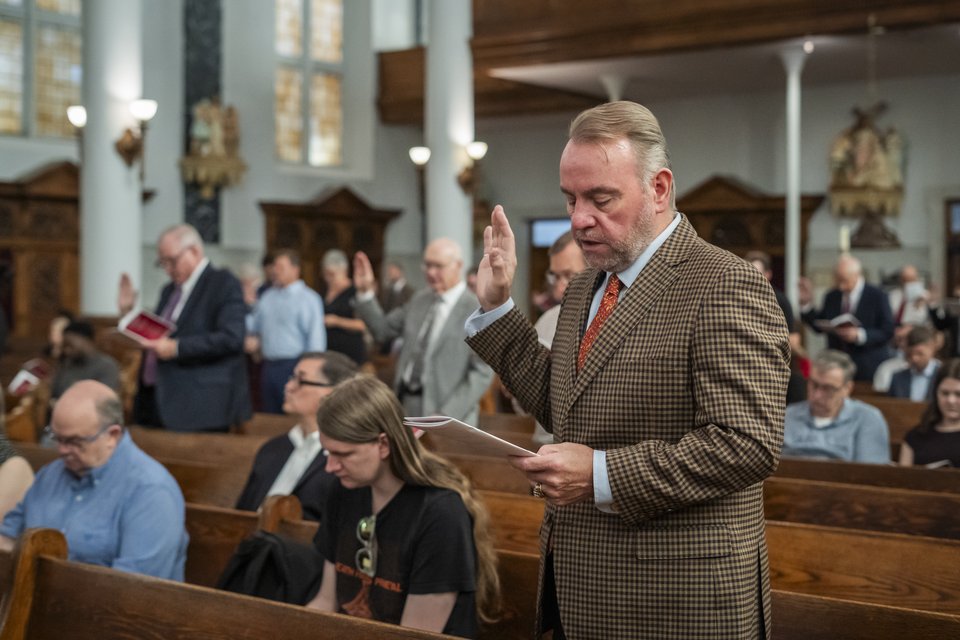Editor's note: This is the fourth of five short articles adapted from the Michigan Catholic Conference's fall newsletter, Focus, "A Catholic Approach to Voting in the 2024 Election." To read the full version or to access more election resources for Catholics, visit the Michigan Catholic Conference's election guide.
The social teachings proclaimed by the Church offer a refreshing vision of hope, because they are founded in God, who is the infinite source of all goodness and love. Accepting with prayer the Church’s teachings will challenge longstanding voting habits and even historic loyalty to a particular party. However, a conscience formed by these teachings provides a cohesive and consistent perspective on current issues, where political choices are guided by faith, rather than by partisan stances.
To help summarize the Church’s social tradition, the following nine advocacy principles help illustrate what the Church teaches and are meant to assist in evaluating candidate positions on policy issues.
Upon reflection, Catholic voters should ask themselves if the candidates for whom they are considering voting embody these principles, and if so, how.
Upholding the dignity of human life
The Church proclaims every human person is created in the image and likeness of God and that each person possesses inherent and inviolable human dignity, present from the moment of conception until natural death.
Defending human life from willful destruction is a pre-eminent issue, the bedrock principle for promoting the common good. It means that every person — regardless of his or her stage of life or condition — has a right to life, and to live in a dignified manner through the provision of his or her basic needs.
Providing for the poor and vulnerable
Because of its special concern for the poor, the Church believes public policies must prioritize those who struggle to make ends meet, preserve the social safety net, and promote affordable housing, child care, and decent jobs. The rights of workers should be supported, which includes the payment of just wages and the ability to organize and bargain collectively without reprisal.
Protecting religious liberty and the freedom to serve
Catholics serve others, particularly those in need, by volunteering at and operating soup kitchens, health care facilities, refugee shelters, food pantries, pregnancy centers, and homeless shelters, among other service agencies. Such acts of charity are driven by Jesus’s commandment to ‘love thy neighbor’ and to do so with fidelity to His teachings. Protecting religious liberty — the right to worship and to practice one’s faith freely — means the rights and freedoms guaranteed by the First Amendment must be maintained and protected in public life.
Supporting students, schools, and parents
Parents are the primary educators of their children, and so the Church believes parents have the right to direct their children’s education in accordance with their convictions. This includes the right for parents to send their child to the school of their choice, and for the state to make those choices available to all.
Strengthening marriages and families
Family built upon marriage is the central institution of social life, thus the Church advocates for policies that support and strengthen both marriage and family life. This includes promoting marriage as the lifelong covenant between one man and one woman, as well as policies that safeguard the rights and welfare of children.
Improving access to health care
The Church believes affordable and accessible health care is a fundamental human right and must be extended to the poor, uninsured, unemployed, and other vulnerable populations.
Pursuing restorative justice
To promote restorative justice, the Church supports efforts that include aiding crime victims and their families, assisting people leaving prison as they reintegrate into society, and strengthening relationships between police and the communities they serve.
Welcoming immigrants and refugees
In recognizing the inherent dignity of migrants and refugees, the Church advocates for an immigration system that ensures humane treatment, protects families, and offers a path to citizenship, while also maintaining the integrity of our nation’s borders and the rule of law.
Caring for creation and preserving natural resources
The Church promotes responsible stewardship of the environment and the Earth’s natural resources to honor God’s gift of creation. This includes acknowledging and addressing the effects of climate change, with particular emphasis on protecting the people most affected by adverse climate conditions.
Copy Permalink
Faithful citizenship











